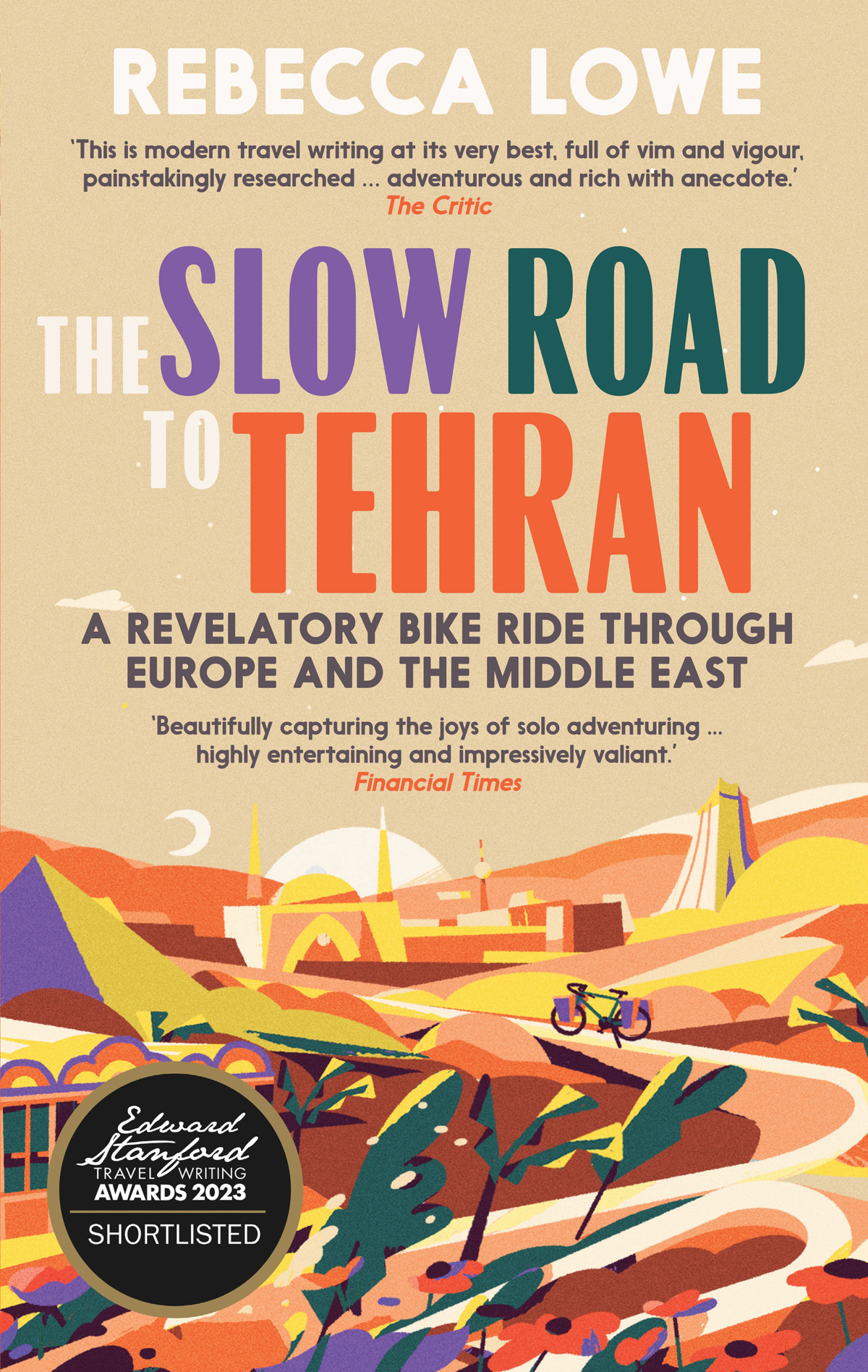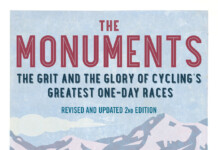By Lou Melini — This is my first book review for Cycling West in some time. The cycling themed books that I have looked at (briefly) in the past few years have been stale with sameness. Travelogues or, worse yet, an account of one’s suffering and self-made adventure appear to be the current fashionable writing. As a result, I have had little interest in writing reviews of books that would have a review of rejection. Dave Iltis, editor and publisher of Cycling West asked if I would be interested in Rebecca Lowe’s book The Slow Road to Tehran. After a quick scan of a couple of reviews, my curiosity was aroused so I accepted the task. A week later the book arrived from the distributor.
I will start my review by succinctly stating that Ms. Lowe’s book is a worthwhile read. It will be hard to out-review many of the excellent reviews already given to The Slow Road to Tehran. The British cycling publication, Road.CC, gave an excellent review and Momentum Mag (Canadian cycling publication, not to be confused with the Multiple Sclerosis publication, Momentum magazine), published a behind the scenes interview that was enlightening. Even the Financial Times did a nice review of the book.
 Ms. Lowe is an accomplished writer. She is British with a BA degree in English Literature from Cambridge. She went to Stanford on scholarship earning a MA in Journalism. Prior to her writing The Slow Road to Tehran, she worked as a journalist for the International Bar Association as the chief reporter specializing in human rights. She also was a freelance journalist specializing in Human Rights and the Middle East. Her background heavily influences her book.
Ms. Lowe is an accomplished writer. She is British with a BA degree in English Literature from Cambridge. She went to Stanford on scholarship earning a MA in Journalism. Prior to her writing The Slow Road to Tehran, she worked as a journalist for the International Bar Association as the chief reporter specializing in human rights. She also was a freelance journalist specializing in Human Rights and the Middle East. Her background heavily influences her book.
In 2014, Ms. Lowe was in Beirut, Lebanon “interviewing politicians, activists and aid workers to report on the worst refugee crisis the region has ever known”. Despite dire warnings of trouble, she decides to ride a bicycle up the coast to Tripoli to “speak to the people living and surviving on the front line”. Thus, the seed is planted, a London to Middle East bike journey.
Several of the reviews I look at started by stating; “In 2015, as the Syrian War raged and the refugee crisis reached it’s peak, Rebecca Lowe set off on her bicycle across the Middle East”. It makes me wonder if the reviewers read the book, or simply read reviews. The statement is true, though the Syrian War is only a very small focus of the book with descriptions of refugee camps in Lebanon and Syria and relatives going into the camps to provide aid. From London, Ms. Lowe cycled across Europe (UK, France, Switzerland, Italy, Slovenia, Croatia, Bosnia, Montenegro, Albania, Serbia, Kosovo, Bulgaria) to Turkey. She continued on to Lebanon, Jordan, Egypt, Sudan, Oman (and UAE) and into Iran completing 11,000 Km (~6800 miles) and one year away from home.
To say this her journey was remarkable would be a gross understatement. Oppressive heat, a few roads that left her pushing her bike, lack of water and the inopportune flat tire (all flats are inopportune) would push a lesser person to quit. On the other hand, 97% of her trip gave her joy and fulfilled the purpose of why she left London on a bicycle.
As I mentioned earlier, Ms. Rowe has a BA from Cambridge in English Literature. I consider myself well-read but I put a dictionary next to me reading the book. (Revelatory in the subtitle means ”revealing, something hitherto unknown”.) There were references from classical literature that left me feeling like a high school drop-out. She described herself before leaving London as “more Sancho Panza than Don Quixote, and arguably more Rocinante (Don Quixote’s horse) than either.”
On one page she described her host as having “puckish charm” (playful in mischievous way) and a couple of pages later a person she met had oleaginous charm (exaggeratedly and distastefully complimentary). There are several British terms, podgy being one, though easily translated to pudgy. I learned much from reading the book, though at times I just wanted to read. Culture, religion, politics and history are prominent features as Ms. Lowe travels through each region. Who knew that Terra Nullius is “land that is legally deemed to be unoccupied or uninhabited as happened in a section of land between Egypt and Sudan due to Britain creating two distinct borders perhaps a century ago. In Tehran there is a main road that has had numerous names depending on the ruling regime. Ms. Lowe summarizes the name changes by writing:
“Through this metamorphic identity, the road becomes not just schismatic but prismatic, wrenched not just between to polar extremes but scrabbled over by tsarists, leftists and Islamists; chadoris, intelligentsia and nouveau riche; Basijis, Yarsanis and trendies.”
Ms. Lowe was a cyclist before her journey, but she had never traveled on a bike except for one multi-day trip in which her gear was carried in a truck in 2009 and her Lebanon ride. Her bike, donated by Kona and henceforth named Maud, arrived approximately 24 hours before her planned departure. Not counting “water and gin”, but with a “ukulele” her bike weighed 10 stone. (A stone weight is 6.35 Kg or 14 pounds). There are no gear ratios, components or other bike gear mentioned in the book.
Ms. Lowe’s self-deprecating and generally humorous writing in the book is a welcome style. For example, on the ferry to Sudan:
“Please watch out,” he says. “There are many dangers.”
“What dangers?” I ask.
“Well, there are scorpions,” he says finally. “And the insects are quite big.” For a police state renowned for violent conflict, ruthless repression and homegrown terrorism, these concerns seem manageable.
“Thank you,” I reply.
As a solo cyclist, and a female one these were more nuisances than serious dangers. She needed to wear proper attire in the Arab and Muslim countries. She had to register at police stations who sometimes followed her when she traveled. She had multiple inappropriate solicitations for sex and had her breast grabbed once (?) and her butt several times. She used Couchsurfing.com and acquaintances from her journalism career for a portion of her housing. In a few cases her hosts were taken in by the police and interrogated. She had to hide her past as a journalist.
I hope this review is published before the holiday season that is quickly approaching. Buy it for a spouse, significant other, friend or yourself. It is a good read that will entertain and educate you, wrapped in a year-long bike ride. The book will never cause you to neglect it for very long. Ms. Lowe brings to life the lives of many individuals in many countries, perhaps one of the most interesting aspects of the book.
“Aisha, my host for the night, meets us mid-debate. Clad in a black niqab and abaya, she doesn’t engage with the conversation. Back at her flat, Aisha transforms. Removing her cloak and veil to reveal a casual t-shirt, jeans and an open, inquiring face, she chats animatedly. She studied engineering before switching to medicine.”
In the words of Rebecca Lowe, “If you are hoping for rousing tales of sporting prowess or pushing the limits of physical endurance — stop reading. If you’re after an informed analysis of the difference between cantilever and caliper brakes, or the pros and cons of an internal gear hub, this isn’t the book for you”. However, if you want a well-written book by an adventurous journalist on a bicycle that delves into the heart and soul of Europe and the Middle East this will make a great book to read.
- The Slow Road to Tehran: A Revelatory Bike Ride through Europe and the Middle East
Author: Rebecca Lowe
September Publishing; 2022
ISBN 13: 978-1914613029
Lou Melini is a lifelong bicycle commuter, tourer, and the former Commuter Column editor for Cycling West.






